The Philippine Virtual Plenary
|
| |








 |
The development of a Philippines Virtual Plenary
Network is envisioned to play a significant role in
providing the venue for consensus building and
concurrently, in meeting the existing and future
demand for information, knowledge sharing and
acquisition, including coordination amongst key
stakeholders in the Philippines' policy development
environment.
The initiative has the following objectives:
 |
to establish the PVP Network |
 |
to increase broad based multi-stakeholder
participation and dialogue |
 |
provide a learning environment, promoting the
sharing of knowledge, experiences and resources |
Various activities were undertaken for the
Project, such as -
 |
Research
and interviews of persons regarding how their
network/portal is able to able to effectively
function as a venue for interaction and/or resource
sites
|
 |
Workshop
to brief selected stakeholders, to design the
website and the elements of the portal, and to draft
the implementation plan of the PVP Net (10 - 11
January 2005 at the Meralco Management and Learning
Development Center, Antipolo City)

|
 |
Training
of PSDN Technical Team which covered using features
that are needed for the trainors to train other
users in the use of the site (20 January 2005 at
UNDP, Makati City)
|
 |
Users' Training for the Core
Group to use the features of the PVP Net website
(04 February 2005 at the National Computer Center,
UP-Diliman, Quezon City)
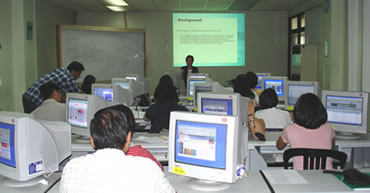 |
| |
more pictures of the
Users' Training >>
|
 |
"Soft"
Launching of the PVP Network which was attended by
most of the attendees of the Users' Training (04
February 2005 at Cravings' Restaurant, Quezon City)
 |
| |
more pictures of the
"Soft" Launching of PVPNet >>
|
 |
Users' Training for the House of
Representatives Staff to use the features of
the PVP Net website (11 January 2006 at the
National Computer Center, UP-Diliman, Quezon City)
 |
| |
more pictures of the
Users' Training >>
|
 |
Meeting
with the Core Group to decide on protocols and plan
for the year 2006 activities (17 January 2006 at
the Astoria Plaza, Pasig City)
 |
| |
|
 |
Meeting
with the Core Group to explore the PVPNet and set up
respective online discussion groups. Also
discussed were ways to enhanced the portal and
reaching out for more users (27 July 2006 at
the National Computer Center, UP-Diliman, Quezon
City)
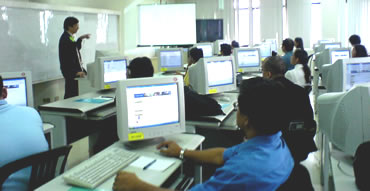 |
| |
|
 |
Presentation of the PVPNet to the Capacity 2015
Philippines Project Meeting (28 September 2006 at
the Supreme Hotel, Baguio City), and to the
International Multi-Sectoral Joint Conference on
Multifunctionality of Agriculture and the Three UN
Conventions of Biodiversity, Climate Change and Land
Degradation (28-30 December 2006 at Marco Polo
Hotel, Cebu City) |
| |
|
 |
Users' Training (to use the features of the PVP Net website)
for the CAP2015 Project Partners (29 September 2006 at Supreme
Hotel, Baguio City), for the PCSD Sub-Committee
on Information and Education (19 September 2006
at National Computer Center, Quezon City), for the Civil Society
Counterpart Council for Sustainable Development (19
December 2006 at National Computer Center, Quezon City),
and for the House of Representatives' Committees on
Ecology and Natural Resources (15 January 2007 at
the PSDN Office) |
| |
|
 |
Trainings were conducted to moderators of various
working groups: June 2006 and 11 September 2006,
CSCCSD; 25 September 2006 and 23 October 2006, ENR CORE; 04 October
2006, CAP2015; PCSD Sub-Committee on Information
and Education; 11 October 2006, ECSOM; and 10
November 2006, HOR Committee on Ecology |
| |
|
 |
Meetings
with the Core Group to plan future activities (19
September 2006 at the National Computer Center,
Quezon City)and (13 & 14 November 2006 at
the Meralco Management and Leadership
Development Training Center, Antipolo City) |
| |
|
 |
On 04
December 2006, the launch of The Philippines Virtual Plenary (PVPNet)
was held at the Crowne Plaza Hotel, Ortigas
Center. The event celebrated products,
tools and the continuing process envisioned to
formalize the efforts to manage information and its
transformation into value-crating knowledge. It
pulled together policy documents, ENR Sector
information, project management models for
environmental initiatives, efficient information
sharing mechanisms, access and discussion platforms,
and various IEC tools and advocacy products that
offer stakeholders the options on how to respond to
the call for actions. |
| |
|
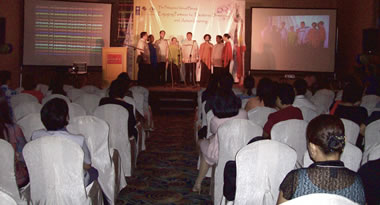 |
| |
|
|
|
The PVP Network is now on-line at -

|
|
|
The project is
with funding assistance from the United Nations Development
Programme through the ENR-CORE Programme. |
| |
 back to top
back to top
|
| |
|
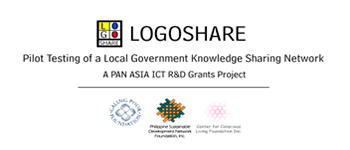
In collaboration
with -
Galing Pook Foundation
Center for Conscious Living Foundation
|
| |
|
The Project, which is funded by the PAN-ASIA, aims to test
an ICT-mediated mechanism for knowledge
sharing among local government units in the Philippines
particularly among planning and development
officers/coordinators.
The project has 5 components:
|
1. |
Pooling
of existing knowledge bases in best practices, tools,
templates, know-how in local governance and local
development. |
|
2. |
Inventory,
design of a taxonomy or classification system and
development of an e-Directory of existing expertise in
local governance and local development. |
|
3. |
Action
research and piloting of an e-group among local
(municipal, city and province) planning and development
officers/coordinators to develop a knowledge-sharing
culture and to uncover what their priority knowledge needs
for local governance and development at the local level. |
|
4. |
Developing
a bottom-up system where local planning and development
officers/coordinators themselves will design and maintain
a knowledgebase for thie priority needs. |
|
5. |
Developing a top-down Help Desk where experts on various
technical areas/sub-areas of local governance and local
development volunteer give freely their expertise through
on-line consultation for those who need information and
knowledge in the local level. |
|
| |
Consultation-Workshop
Tarragon Room, Cravings Restaurant
Diliman, Quezon City
08 September 2004 |
| |
|
The initial step in the overall strategy of designing and
executing the ICT infrastructure for the network was to determine
the information requirements as well as the capacity of the users
as far as exchanging knowledge is concerned. A core group of
potential users or stakeholders was consulted to facilitate the
process of identifying priority areas of knowledge that would be
most helpful to the local government planning and development
officers. A Consultation-Workshop was held composed of local
Planning and Development Officers from various municipalities and
cities to help define the LOGSHARE ICT Infrastructure contents and
protocols.
|
| |
Consultation-Workshop
Training Room, National Computer Center
University of the Philippines - Diliman, Quezon City
03 and 04 November 2004 |
| |
|
The core group met in November 2004 to establish a bottom-up network that
took into account the needs, capacities, and aspirations of the
key players involved. From the exercise, the core group was
also able to discuss and agree on the protocols of the
network. |
| |
|
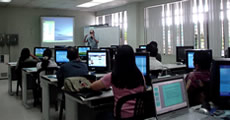
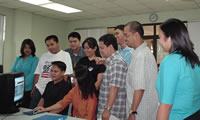
|
ICT
Training-Workshop
National Computer Center
University of the Philippines - Diliman, Quezon City
28 March 2005 |
| |
|
The core group met on 28 March 2005 to
test the new LOGOSHARE facility. The sustainability of the LOGOSHARE
was also discussed.
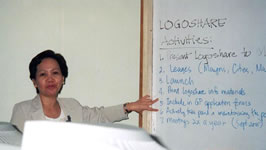
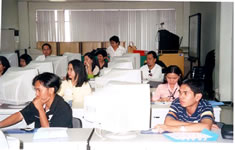
|
|
more pictures of the
ICT Training-Workshop >> |
| |
ICT Workshop
/ Roundtable Discussion
MMLDC Foundation, Inc.
Antipolo City
18 - 19 October 2005 |
| |
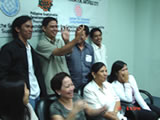
|
In October 2005, the core group met to revisit its goals and assessed their
accomplishments. Identified during the discussions were issues in project
implementation and its alternative solutions.
|
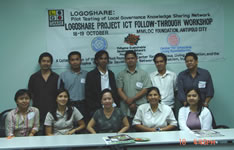
|
|
| |
Core Group Meeting
University Hotel, University of the Philippines
Diliman, Quezon City
27 January 2006 |
| |
|
Planning the activities for the year 2006 was the main agenda of
core group meeting in January 2006.
Issues such as sustainability and promotion of the LOGOSHARE were
also discussed. |
| |
|
to the LOGOSHARE website >> |
| |
 back to top
back to top
|
| |
|
|
Case
Study: Large Scale Mining in a Subanen Tribal Area in
Siocon |
| |
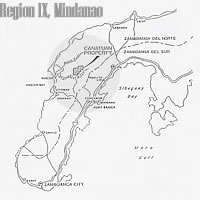
Siocon is a municipality of the Province of
Zamboanga del Norte.
|
The case study is of a large-scale mining activity in an
area in the southern Philippines that have
been the ancestral domain of a small sub-group of
indigenous peoples (Subanen), forested, a watershed, rich in
biodiversity, and wracked in conflict. It seek
to extract lessons from the case relating to the linkage
of resource utilization and governance issues on mining,
forestry, biodiversity, water, and indigenous cultures.
The study aimed to:
-
Capture lessons on environmental governance on mining, water,
forests and biodiversity, when these occur in an
ecologically and culturally sensitive site affected by
armed conflicts;
-
Identify and understand the environmental governance issues in the
area;
-
Identify lessons on environmental governance that might be shared
with countries in the Asia-Pacific, consistent with the
objectives of the UNDP REG Programme.
|
|
|
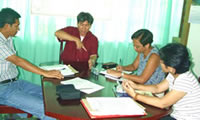
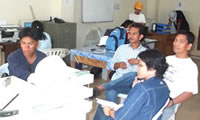
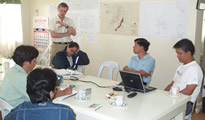
|
|
Pictures taken during the field visits of
the study team (March and April 2005). |
|
to the case study
report >> |
|
|
 back to top
back to top
|
| |
|
| The
Asia-Pacific Learning Event |
| |
|
The Philippine Sustainable Development Network (PSDN),
with support from the Resource Management in Asia-Pacific
Program of The Australian National University (ANU),
held a Learning Event on behalf of the Communities and
Small-Scale Mining (CASM) Network at the
Conference Center of the Asian Institute of Management
(AIM), Makati City, Philippines on 7 - 12 June 2005.
The event, with the theme - Community and State Interests in
Small-Scale Mining: Sharing Experiences from the
Asia-Pacific Region, provided a forum for participants from
the countries of the Asia-Pacific region including the
Philippines to share their knowledge and experience of some
of the key achievements and ongoing issues surrounding
artisanal and small-scale mining in the region.
The participants also got the opportunity to interact with
the local community of small scale miners during their field trip
to Itogon, Mountain Province.
|
|
|
| |
|
to the conference website >> |
| |
 back to top
back to top
|
| |
|
| back |
Philippine
Sustainable Development Network Foundation, Inc. |

|
| |
|
|